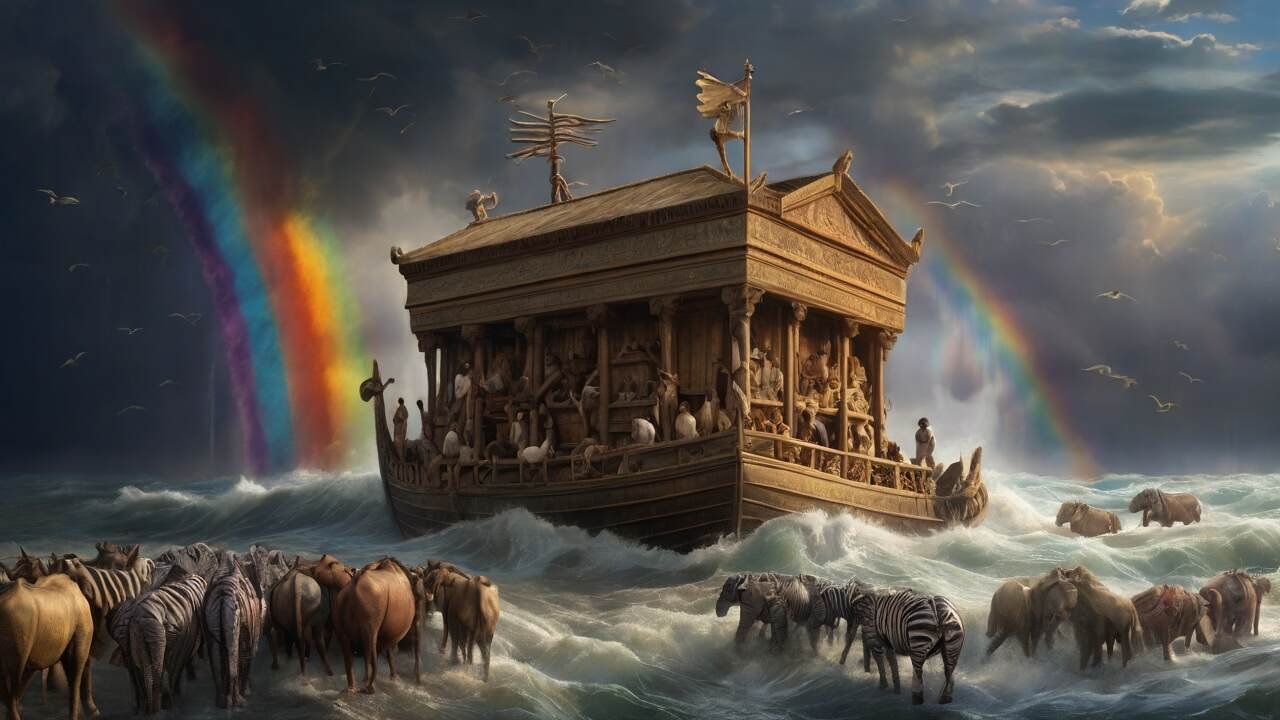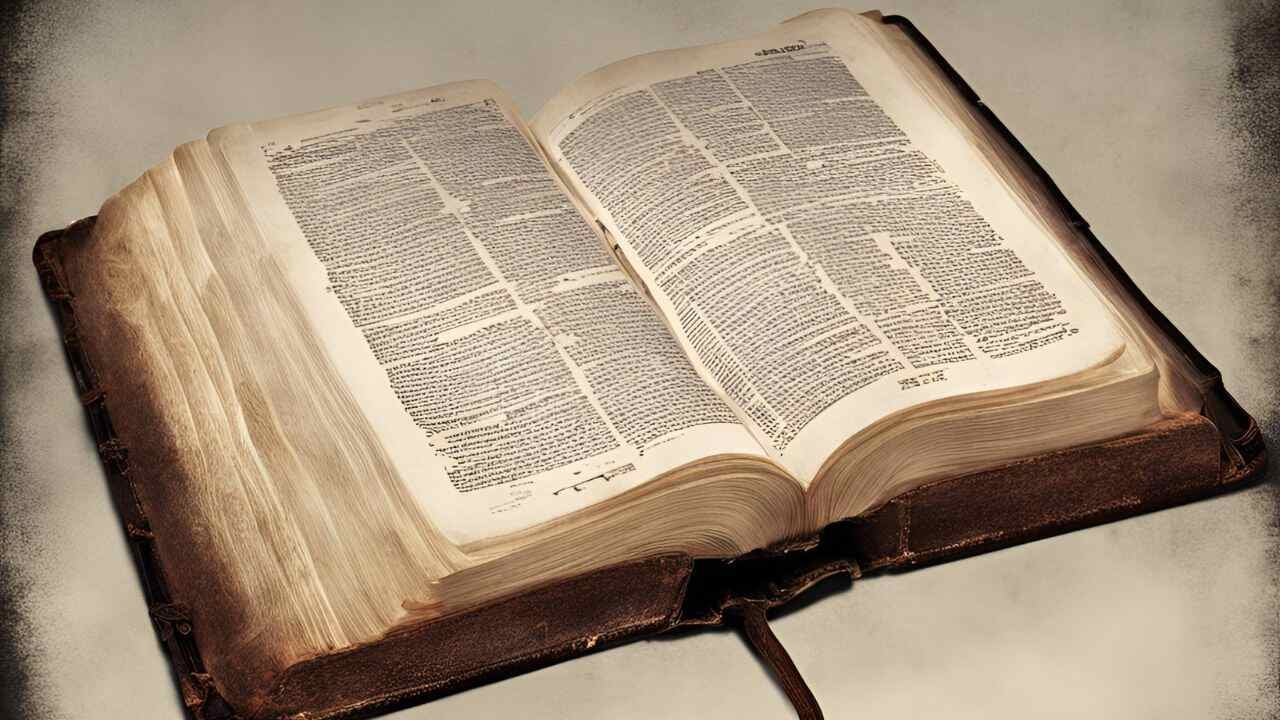The Bible is the most widely read book of all time, surpassing even beloved classics like The Lord of the Rings and Harry Potter. Over the past 50 years, it has sold an astounding 3.9 billion copies. The modern Protestant Bible is divided into two distinct sections: the Old Testament (39 books) and the New Testament (27 books). This arrangement highlights the birth of Jesus, with the Old Testament revealing the emerging prophecies of the Messiah and the New Testament chronicling Jesus’ birth, death, and resurrection.
However, the number of books in the Bible can vary across different Christian traditions. The Catholic Bible contains 73 books, while the Orthodox Bible has 81 books. These differences stem from the various interpretations and canonical decisions made by different branches of Christianity over time.
Key Takeaways
- The modern Protestant Bible has 66 books, with 39 in the Old Testament and 27 in the New Testament.
- The number of books in the Bible can differ across Christian denominations, with the Catholic Bible having 73 books and the Orthodox Bible having 81 books.
- The Bible is the most widely read book of all time, with over 3.9 billion copies sold in the last 50 years.
- The arrangement of the Old and New Testaments highlights the birth of Jesus, with the Old Testament revealing prophecies of the Messiah and the New Testament chronicling His life, death, and resurrection.
- Understanding the differences in the number of books in the Bible across Christian traditions is important for studying and understanding the scripture.
Introduction to the Old Testament
The Old Testament holds immense significance for those within the Christian faith. This sacred text, also known as the Hebrew Bible or the Tanakh, is a collection of 37 books that document the ancient history of the Israelite people and serve as the moral foundation for both the Christian and Jewish faiths.
The Old Testament encompasses a vast array of literary styles, including short stories, letters, poetry, and historical accounts. It chronicles the creation of life and the story of humanity, leading up to the birth of Jesus Christ, the central figure of the New Testament.
The Significance of the Bible
The Bible, as a whole, is a sacred text that holds immense significance for those within the Christian faith. It serves as the moral and spiritual foundation for the beliefs and practices of Christianity, providing guidance, wisdom, and inspiration to millions of believers worldwide.
“The grass withers, the flower fades, but the word of our God will stand forever.” – Isaiah 40:8
Organization of the Old Testament
The Old Testament can be further divided into several subcategories, each with its own distinct focus and purpose:
- The Pentateuch: The first five books, also known as the Books of Moses, which detail the creation of the world, the Israelite exodus from Egypt, and the establishment of the Mosaic Law.
- The Historical Books: Accounts of the Israelite conquest of Canaan, the rise and fall of the Kingdom of Israel, and the subsequent exile and return of the Israelites.
- The Wisdom Books: Works of poetry, philosophy, and spiritual reflection, including the Psalms, Proverbs, and Ecclesiastes.
- The Prophetic Books: Writings of the major and minor prophets, who delivered messages of judgment, repentance, and hope to the Israelite people.
Together, these diverse collections of Old Testament books form the foundation of the Christian faith, providing an essential understanding of the origins, history, and teachings that shape the beliefs and practices of millions of believers worldwide.
The Pentateuch
The Pentateuch, also known as the Torah, is a vital component of the Old Testament and the Hebrew Bible. This collection of the first five books—Genesis, Exodus, Leviticus, Numbers, and Deuteronomy—documents the history and origins of the world, as well as the creation and early development of the Israelite people.
Collectively, these five books are referred to as the “Five Books of Moses” due to their traditional attribution to the prophet Moses. They serve as the foundation for both the Jewish and Christian faiths, providing a comprehensive account of God’s relationship with humanity and the establishment of the Israelite nation.
The Five Books of Moses
- Genesis: Describes the creation of the world, the story of Adam and Eve, and the origins of the Israelite people through the patriarchs Abraham, Isaac, and Jacob.
- Exodus: Narrates the Israelites’ departure from Egypt, their journey through the wilderness, and the establishment of the Mosaic covenant at Mount Sinai.
- Leviticus: Outlines the laws and rituals that govern the Israelite religious and social life, including the establishment of the priesthood and the system of sacrifices.
- Numbers: Recounts the Israelites’ wanderings in the wilderness and the organization of the nation as they prepare to enter the Promised Land of Canaan.
- Deuteronomy: Records Moses’ final speeches to the Israelites, including the reiteration of the laws and the preparation for the conquest of Canaan.
Together, these five books form the foundation of the Pentateuch, providing a comprehensive account of the origins, history, and religious traditions of the Israelite people. They serve as a vital resource for understanding the roots of both Judaism and Christianity.
“The Pentateuch is the cornerstone of the Hebrew Bible, offering a comprehensive narrative of the creation, history, and covenantal relationship between God and the Israelite people.”
How many books are in the Old Testament?
The Old Testament, which forms the foundational scriptures for both Judaism and Christianity, is a collection of sacred texts that hold profound significance for billions of people worldwide. The number of books contained within the Old Testament, however, can vary depending on the specific religious tradition and canon.
In the Protestant Bible, the Old Testament consists of 39 books. These 39 books correspond to the 24 books of the Tanakh, the Hebrew Bible, which is the canonical collection of Jewish scripture. The Tanakh is divided into three main sections: the Torah (the five books of Moses), the Nevi’im (the books of the prophets), and the Ketuvim (the writings).
The Catholic Bible, on the other hand, includes 46 books in the Old Testament. This expanded canon includes several additional texts, known as the deuterocanonical or apocryphal books, which are not considered part of the Hebrew Bible by Protestants. These deuterocanonical books include works such as Tobit, Judith, 1 and 2 Maccabees, and others.
The Eastern Orthodox and Oriental Orthodox churches have an even more extensive Old Testament canon, with up to 49 books. These additional books are also considered deuterocanonical or apocryphal by Protestants, but they are regarded as fully canonical within the Eastern and Oriental Orthodox traditions.
The differences in the number of books in the Old Testament can be attributed to the varying perspectives on the inclusion and authority of certain texts within different Christian and Jewish traditions. However, the 39 books common to all Christian canons remain the core of the Old Testament, representing the foundational scriptures that have shaped the religious, cultural, and historical landscape for millions of believers around the world.
“The Old Testament is the first part of the Christian Bible, which is also the Hebrew Bible of Judaism. It tells the story of the creation of the world, the early history of God’s chosen people, and the development of God’s plan of salvation.”
Historical Books of the Old Testament
The historical books of the Old Testament recount the epic journey of the Israelites, chronicling their conquest of the Promised Land and the establishment of the powerful kingdoms of Israel and Judah. These captivating narratives, which include the books of 1 and 2 Samuel, 1 and 2 Kings, and 1 and 2 Chronicles, Ezra, and Esther, provide a comprehensive account of the Israelites’ rise, their triumphs and tribulations, and ultimately, their exile.
The Conquest of Canaan
The Conquest of Canaan marks a pivotal chapter in the history of the Israelites. After their deliverance from Egyptian bondage and the Exodus, the Israelites, led by the legendary Joshua, embarked on a remarkable military campaign to claim the land promised to their forefathers. This epic journey, chronicled in the book of Joshua, details the Israelites’ strategic victories, their battles against the formidable Canaanite kingdoms, and their eventual establishment of control over the region.
The Kingdom of Israel
The historical books then transition to the era of the Kingdom of Israel, a unified nation under the leadership of Saul, David, and Solomon. The reign of these kings is meticulously documented, revealing the rise and fall of the kingdom, the divisions that led to the emergence of the separate kingdoms of Israel and Judah, and the eventual exile of the Israelites to Babylon. These books offer a profound and insightful exploration of the complexities of power, leadership, and the consequences of human choices.

“The historical books of the Old Testament provide a comprehensive and captivating account of the Israelites’ journey, from their conquest of the Promised Land to the rise and fall of their kingdoms, offering a profound insight into the human experience.”
Wisdom and Poetic Books
The Old Testament contains a remarkable collection of Wisdom Books and Poetic Books that offer profound insights into the human experience and the nature of God. These captivating works, including Job, Psalms, Proverbs, Ecclesiastes, and Song of Songs, are treasured for their spiritual depth and literary brilliance.
The Wisdom Books delve into questions of good and evil, addressing the challenges and complexities of life with a keen understanding of the human condition. These books provide a tapestry of poetry, narratives, and moral teachings that have inspired and comforted generations of readers.
At the heart of the Wisdom Books stands the timeless classic, Job. This profound narrative explores the age-old question of why the righteous suffer, offering a profound exploration of faith, justice, and the nature of God. The book’s powerful dialogues and poetic language have captivated readers for centuries.
Equally renowned are the Psalms, a collection of lyrical prayers and praises that have been cherished by people of faith for millennia. These deeply personal and emotive poems cover a vast range of human experiences, from lament and thanksgiving to trust and awe.
- Proverbs presents a treasury of practical wisdom and moral guidance, offering timeless principles for living a virtuous and fulfilling life.
- Ecclesiastes grapples with the meaning of life, exploring the fleeting nature of earthly pursuits and the importance of finding true purpose in the divine.
- The Song of Songs is a poetic celebration of romantic love, a testament to the beauty and power of human relationships.
These Wisdom Books and Poetic Books of the Old Testament stand as enduring monuments to the human spirit, guiding readers on a journey of self-discovery and spiritual enlightenment. Their timeless wisdom and poetic brilliance continue to captivate and inspire people of faith around the world.
“The fear of the Lord is the beginning of wisdom, and the knowledge of the Holy One is insight.” – Proverbs 9:10
Prophetic Books
The Old Testament is a captivating tapestry woven with the threads of prophecy, where the voices of God’s messengers echo through the ages. Collectively known as the Prophetic Books, these sacred writings offer a profound and transformative glimpse into the divine plan for humanity. Divided into the Major Prophets and the Minor Prophets, these books not only document the pivotal events of ancient Israel but also illuminate the lasting significance of these occurrences and the powerful messages God entrusted to His prophets.
The Major Prophets
Comprising the books of Isaiah, Jeremiah, Ezekiel, and Daniel, the Major Prophets stand tall as the most extensive and influential of the Prophetic Books. These visionaries, commissioned by God, delivered messages that not only addressed the immediate concerns of their time but also pointed towards the coming Messiah and the eventual establishment of God’s eternal kingdom.
The Minor Prophets
Equally crucial in their contribution to the Old Testament canon are the Minor Prophets, which include the books of Hosea, Joel, Amos, Obadiah, Jonah, Micah, Nahum, Habakkuk, Zephaniah, Haggai, Zechariah, and Malachi. These prophets, though shorter in their written works, deliver messages of hope, judgment, and the promise of a future restoration that would ultimately be fulfilled in the life, death, and resurrection of Jesus Christ.
“The Lord spoke through the prophets long ago, and he speaks again in these last days through his Son.” – Hebrews 1:1-2
The Prophetic Books of the Old Testament stand as a testament to the unwavering faithfulness of God, who continually reaches out to His people through the voices of His chosen messengers. These timeless works invite us to listen, to learn, and to be transformed by the timeless truths they convey, guiding us towards a deeper understanding of God’s unfailing love and the fulfillment of His divine plan.
The Canonization of the Old Testament
The decision over which books would be included in the Old Testament was based in part on the long history of Jewish canonization with regards to the Tanakh, also known as the Hebrew Bible. The Tanakh has its own history and organization, but it does form the basis for what came to be the Christian Old Testament.
Around the 2nd and 3rd centuries BCE, these key Jewish texts were translated by Jewish scholars from their original Hebrew into Greek, resulting in the Septuagint. The Septuagint included all the books of the Tanakh as well as several other later Jewish texts of cultural significance, which are considered deuterocanonical or apocryphal by Protestants. The Catholic and Eastern Orthodox traditions include many of these additional books in their Old Testament canons, while Protestant traditions do not.
The Hebrew Bible (Tanakh)
The Tanakh, or Hebrew Bible, is the canonical collection of Jewish texts that forms the basis for the Old Testament of the Christian Bible. This collection is organized into three main sections:
- The Torah (the five books of Moses)
- The Nevi’im (the books of the prophets)
- The Ketuvim (the writings)
The Tanakh has been carefully preserved and passed down through Jewish tradition, with the final canonization process completed by the end of the 1st century CE.
The Septuagint and Apocrypha
The Septuagint, a Greek translation of the Hebrew Bible, included additional texts not found in the Tanakh. These additional books are known as the Apocrypha or deuterocanonical books, and they are recognized as part of the Catholic and Eastern Orthodox Old Testament canons, but not by Protestants. The inclusion or exclusion of these books has been a source of debate and division within Christianity.
In summary, the canonization of the Old Testament has a complex history, with the Tanakh (Hebrew Bible) forming the core, and the Septuagint and Apocrypha adding additional texts that are recognized in some Christian traditions but not others.
Conclusion
The Old Testament stands as a profound and transformative collection of sacred writings, providing the foundation for the Christian faith and the prophecies that point to the coming of Jesus Christ. Across different Christian traditions, the number of books in the Old Testament may vary, with the Catholic and Orthodox Bibles including additional texts not found in the Protestant canon.
Delving into the history and organization of the Old Testament offers a deeper appreciation for the rich tapestry of God’s Word and the diverse traditions that have shaped its preservation and dissemination over the centuries. Whether one follows the Tanakh, the Septuagint, or the Apocrypha, the Old Testament remains a cherished part of the Bible and a source of inspiration and guidance for believers around the world.
The Old Testament is a profound testament to the Jewish faith and the Christian scripture, a timeless collection of writings that continue to shape the spiritual lives of countless individuals. Through its pages, we are reminded of the enduring power of the Word of God and the unwavering faith that has sustained believers throughout the ages.
FAQ
How many books are in the Old Testament?
The number of books in the Old Testament can vary across different Christian traditions. The Protestant Bible contains 39 books in the Old Testament, while the Catholic Bible contains 46 books and the Eastern Orthodox Bible contains up to 49 books. The difference is due to the inclusion of additional texts considered deuterocanonical or apocryphal by Protestants.
What is the significance of the Old Testament?
The Old Testament is a crucial part of the Christian Bible, providing the foundation for the faith and the prophecies that point to the coming of Jesus Christ. It documents the history and beginnings of the world, as well as the creation and emergence of the people of Israel, making it the moral teachings and basis of both the Christian and Jewish faiths.
How is the Old Testament organized?
The Old Testament is divided into four main sections: the Pentateuch, the Historical Books, the Wisdom Books, and the Prophetic Books. These sections cover a wide range of literary styles, from short stories and letters to poetry and historical accounts.
What are the books of the Pentateuch?
The Pentateuch contains the first five books of the Hebrew Bible: Genesis, Exodus, Leviticus, Numbers, and Deuteronomy. These books document the history and beginnings of the world, as well as the creation of the people of Israel, and are considered the foundation of both the Jewish and Christian faiths.
How did the canon of the Old Testament come to be?
The decision over which books would be included in the Old Testament was based in part on the long history of Jewish canonization with regards to the Tanakh, the Hebrew Bible. The Tanakh has its own history and organization, but it does form the basis for what came to be the Christian Old Testament. The Septuagint, a Greek translation of the Hebrew Bible, also included additional texts that are considered deuterocanonical or apocryphal by Protestants but are included in the Catholic and Eastern Orthodox canons.








